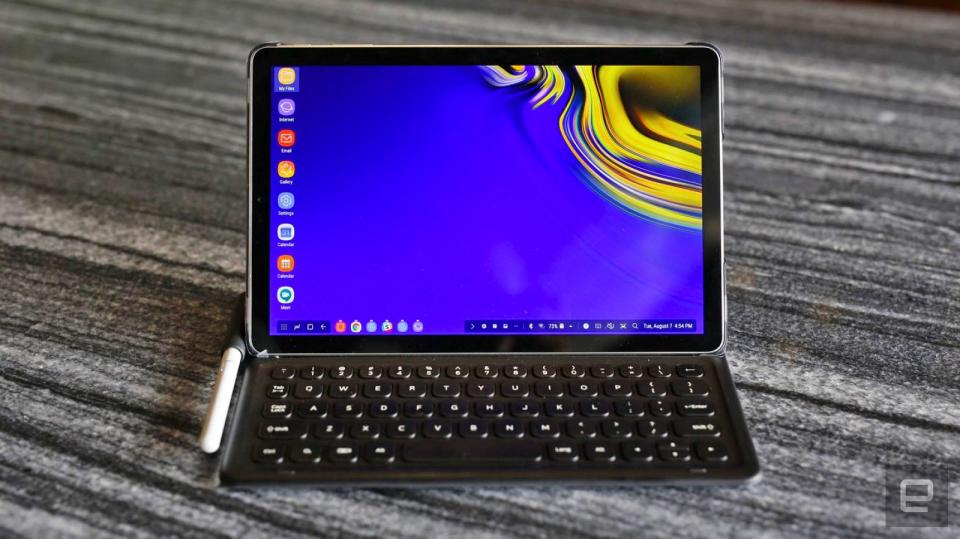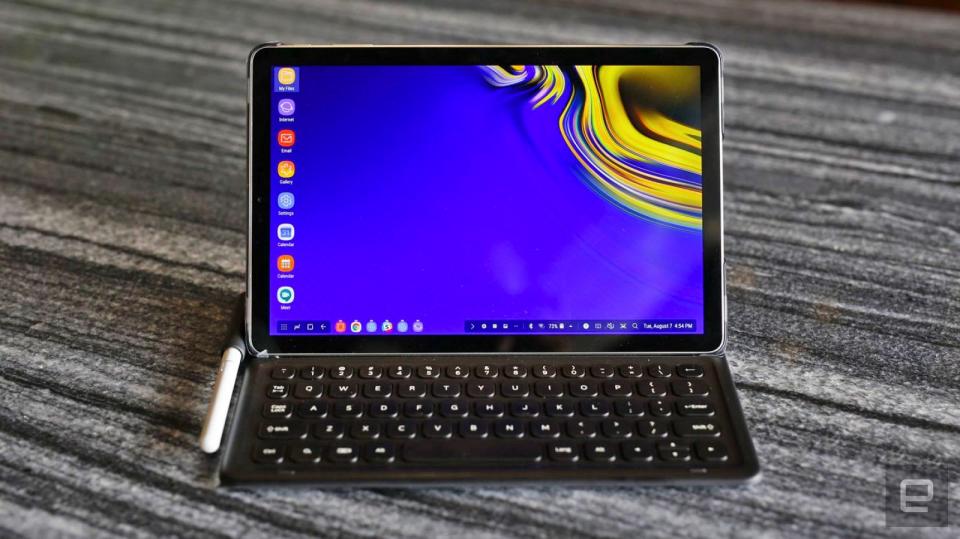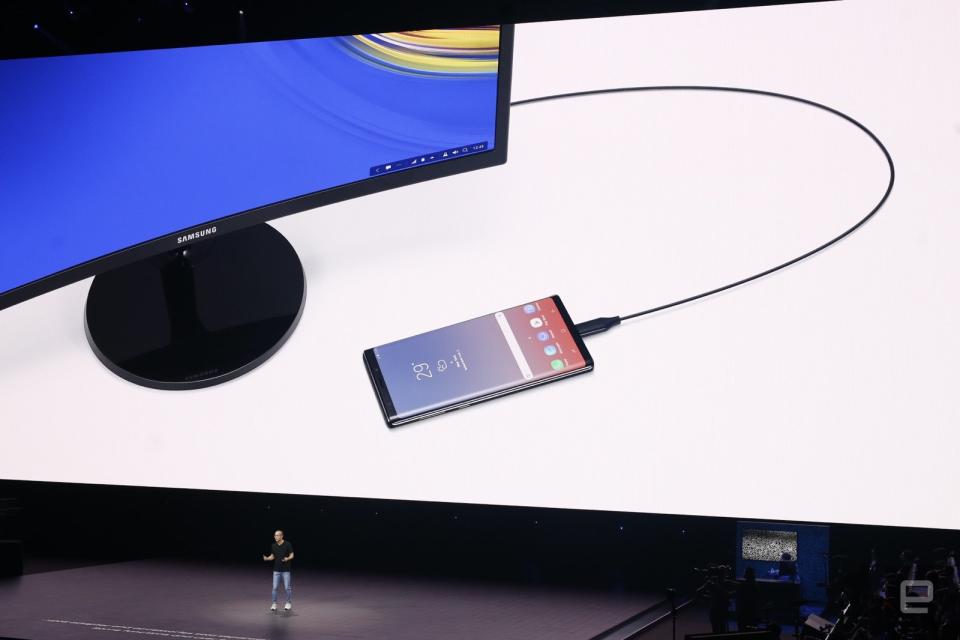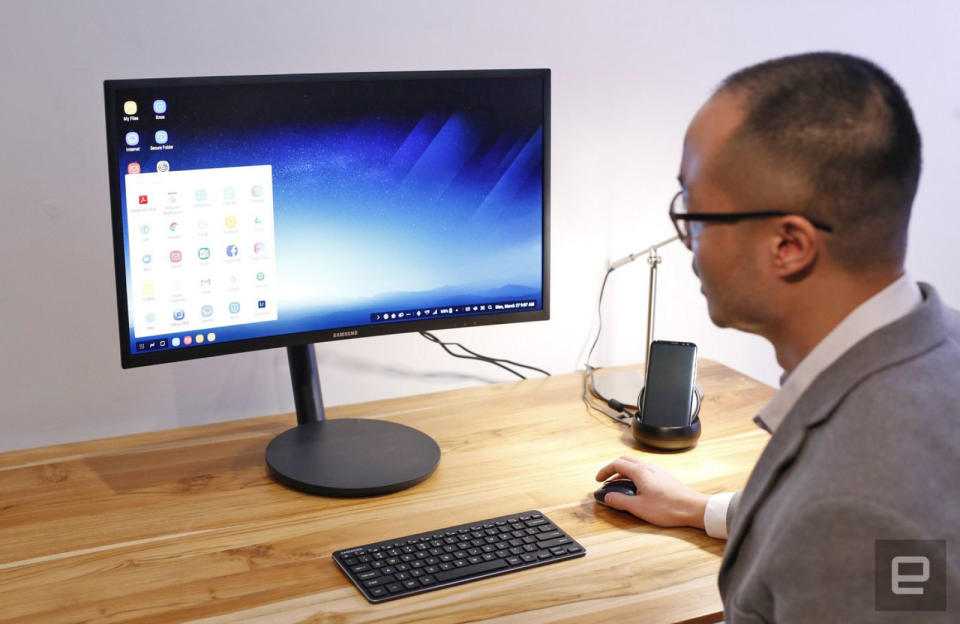Samsung is still trying to make DeX happen
It’s probably not going to happen.
There was a common thread running through Samsung's two big launches this week. Both the Galaxy Note 9 and the Tab S4 feature DeX mode, a desktop-friendly interface for Android devices that the company has been working on since 2017's Galaxy S8. In fact, since the introduction of the DeX dock with the Galaxy S8 last year, Samsung has continued to expand the DeX portfolio, adding new hardware alongside minor compatibility and software updates. The company is clearly invested in making this A Thing, even when numerous tech companies in the past have failed to succeed at smartphone-powered desktops. Why?
Samsung's rationale is something we've heard many times before: People today aren't confined to offices anymore. I for one am constantly writing in the back of cabs, working in airport terminals and going to a dozen meetings a week. We're more connected than ever, and are basically expected to be contactable all the time. Wouldn't it be nice if we didn't have to carry around a laptop to be productive? And since our smartphones have become so powerful, why not tap into that?
The idea of a pocketable laptop-like machine has its merits, and in theory, DeX is promising. It's the combination of a small accessory for the Galaxy S8, Note 8 and S9 with a software mode (like on the Tab S4) that provides a faux desktop system. To minimize the number of loose accessories you have to carry around, Samsung introduced HDMI compatibility on the Note 9, so you can plug it into any supported display with an HDMI to USB-C converter and use the DeX software to immediately get to work. You can leave the converter cable on your desk or attached to the screen, so all you need to bring is your phone. Neat.
Jonathan Wong, director of product marketing at Samsung, told Engadget that streamlining access to DeX has been a "major focus area" for the company over the past couple of years. To Wong, "DeX is really my baby" and he's been showing it off on stage at Samsung's keynotes for the past two years. Those well-rehearsed demos always seemed so compelling and were warmly received, but in the real world DeX didn't live up to its promise.

Since its introduction last year, DeX's software has been improving. It now supports all Android apps. You can run up to 20 resizable windows concurrently, just like you would on Chrome OS or Windows. But DeX mode is Android at heart, and try as it might, it can't shake its mobile roots. This struggle in trying to be a desktop comes with a bunch of quirks that make DeX mode too unreliable. There are far too many to exhaustively list, but here's a selection.
When you're looking up an app after pulling up the search tool, make sure you hit the first letter twice, since DeX will eat up your first keystroke for no reason. Hitting the 'X' to close a window doesn't actually close the app -- it'll still be hanging out in the background, and you'll see it pop back up when you view your open apps, and you'll have to close it from that page. That's how you'd exit a program on mobile, not desktop. Starting a blank document from Google Drive in Chrome doesn't open up a new tab, but launches the Docs app with an error message instead. And when you pair a keyboard to whatever DeX machine you're using, don't expect all your favorite shortcuts to behave like they do on your laptop. A lot of these issues are minor, but they add up to a frustratingly major disconnect.
To be fair, there are some nice things about DeX. I love how you can take a conference call on the phone, dock it on your desktop and seamlessly continue your conversation on the big screen. Being able to open up to 20 Android apps side by side is a super compelling scenario, too. It also seems like it'd be nice to use a full keyboard and screen to play mobile games, although entertainment isn't why Samsung made DeX.
If Samsung's goal is to enable a desktop-friendly interface while maintaining access to all your Android apps, remember that Chrome OS exists. If it's to enable experiences like seamless switching between your phone and desktop, that's why things like Google Docs and cloud computing were created. You can access the same files from any device, anywhere. When you need a keyboard, you go to your PC. When you can't, like when you're in the subway or in an elevator, type on your phone.
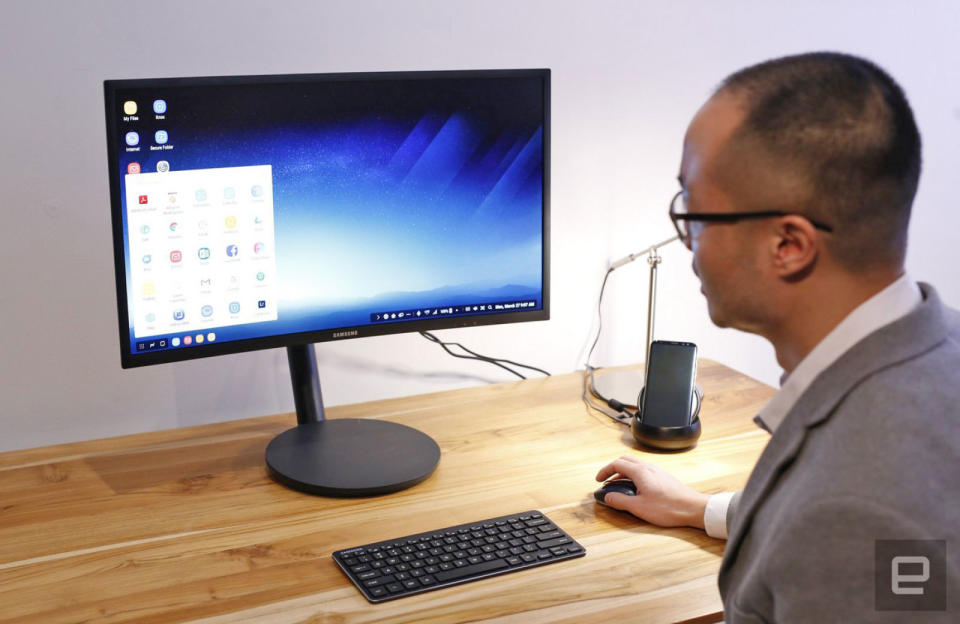
It's not like there aren't past examples to learn from. Microsoft, for instance, gave up its Continuum efforts after the demise of its mobile OS. The Motorola Atrix died an ignoble death, and the HP Elite X3 is something we don't speak of.
But Wong believes the market is now ready for another go, and that Samsung is uniquely positioned to excel where others have failed. DeX isn't simply a hardware solution, he says, nor is it purely a software play. It's about phones, tablets, big screens, peripherals and the platform across those formats. "We at Samsung actually are either the leader or leading in pretty much all those spaces, so we're in a great position," Wong said.
To be fair, DeX mode is a potentially useful tool in specific scenarios, setting the Note 9 apart from other Android phones. Samsung recognizes this, too. "Another part of our strategy is really looking at specific target segments, verticals (and) use cases," Wong added.
Wong said that law enforcement agents, for example, "are all over" the DeX in-vehicle experience. Instead of carrying around a clunky, rugged laptop, officers can get a more streamlined system with DeX when they need to pull over and fill out forms or look things up in databases.
When it's the main selling point, like it was with the Tab S4, DeX is a terrible idea. As a side benefit, it's a cool feature. Making DeX a bonus that people can use if they want is a smarter strategy than going all in. As Wong says, "Humans are humans." Samsung can keep trying to make DeX happen, but any success it finds will likely be outside the mainstream.
